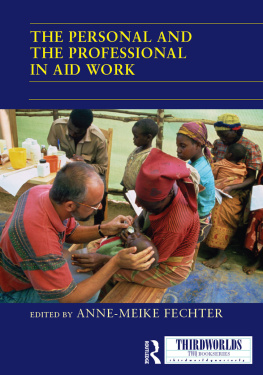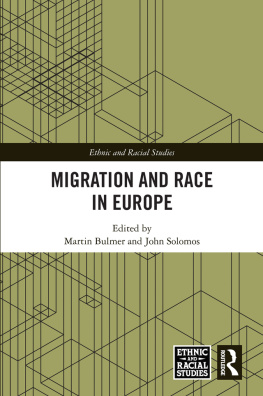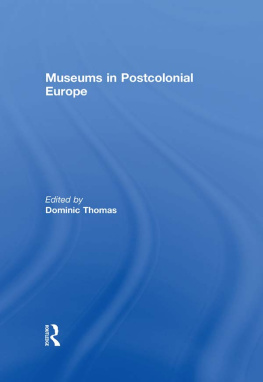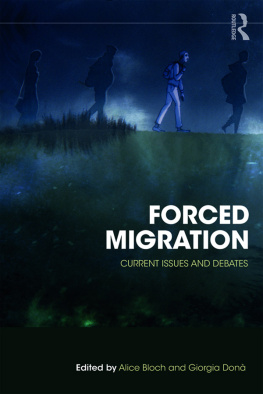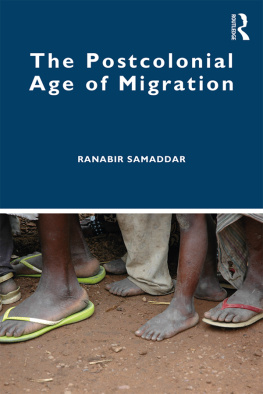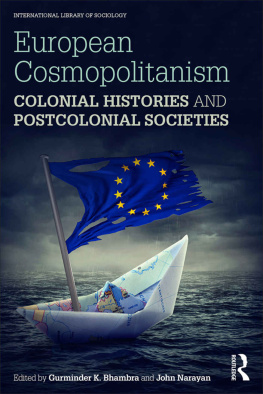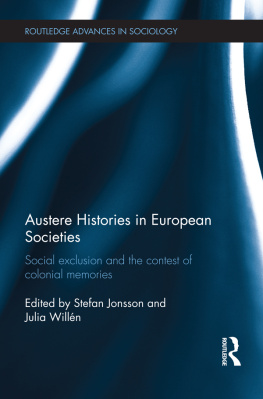The New Expatriates
While scholarship on migration has been thriving for decades, little attention has been paid to professionals from Europe and America who move temporarily to destinations beyond the West. Such migrants are marginalised and depoliticised by debates on immigration policy, and thus there is an urgent need to develop nuanced understanding of these more privileged movements. In many ways, these are the modern-day equivalents of colonial settlers and expatriates, yet the continuities in their migration practices have rarely been considered.
The New Expatriates advances our understanding of contemporary mobile professionals by engaging with postcolonial theories of race, culture and identity. The volume brings together authors and research from across a wide range of disciplines, seeking to evaluate the significance of the past in shaping contemporary expatriate mobilities and highlighting postcolonial continuities in relation to people, practices and imaginations. Acknowledging the resonances across a range of geographical sites in Asia, Africa, and the Middle East, the chapters consider the particularity of postcolonial contexts, while enabling comparative perspectives. A focus on race and culture is often obscured by assumptions about class, occupation and skill, but this volume explicitly examines the way in which whiteness and imperial relationships continue to shape the migration experiences of Euro-American skilled migrants as they seek out new places to live and work.
This book was originally published as a special issue of the Journal of Ethnic and Migration Studies.
Anne-Meike Fechter is Senior Lecturer in Anthropology at the University of Sussex, UK. She is the author of Transnational Lives: Expatriates in Indonesia (2007) and the co-editor of Inside the Everyday Lives of Development Workers The Challenges and Futures of Aidland (2011). Her current research focuses on aid workers as mobile professionals.
Katie Walsh is affiliated with the Sussex Centre for Migration Research as a lecturer in human geography in the School of Global Studies, University of Sussex, UK. Her ethnographic research on British migrants in Dubai explores transnational belonging and identities, with an emphasis on embodiment, emotion, intimacy, and materialities.
The New Expatriates
Postcolonial Approaches to Mobile Professionals
Edited by
Anne-Meike Fechter and Katie Walsh
First published 2012
by Routledge
2 Park Square, Milton Park, Abingdon, Oxon, OX14 4RN
Simultaneously published in the USA and Canada
by Routledge
711 Third Avenue, New York, NY 10017
Routledge is an imprint of the Taylor & Francis Group, an informa business
2012 Taylor & Francis
This book is a reproduction of the Journal of Ethnic and Migration Studies, volume 36, issue 8. The Publisher requests to those authors who may be citing this book to state, also, the bibliographical details of the special issue on which the book was based.
All rights reserved. No part of this book may be reprinted or reproduced or utilised in any form or by any electronic, mechanical, or other means, now known or hereafter invented, including photocopying and recording, or in any information storage or retrieval system, without permission in writing from the publishers.
Trademark notice: Product or corporate names may be trademarks or registered trademarks, and are used only for identification and explanation without intent to infringe.
British Library Cataloguing in Publication Data
A catalogue record for this book is available from the British Library
ISBN13: 978-0-415-50366-2
Publishers Note
The publisher would like to make readers aware that the chapters in this book may be referred to as articles as they are identical to the articles published in the special issue. The publisher accepts responsibility for any inconsistencies that may have arisen in the course of preparing this volume for print.
Contents
Alan Lester
Anne-Meike Fechter and Katie Walsh
James Farrer
Heidi Armbruster
Pauline Leonard
William H. Leggett
Anne-Meike Fechter
Mari Korpela
Anne Coles and Katie Walsh
Ben Rogaly and Becky Taylor
Heidi Armbruster is Lecturer in German and Transnational Studies at the University of Southampton, UK.
Anne Coles is Research Associate at the International Gender Studies Centre, University of Oxford, UK.
James Farrer is Associate Professor of Sociology at Sophia University, Tokyo, Japan.
Anne-Meike Fechter is Senior Lecturer in Anthropology at the University of Sussex, UK.
Mari Korpela, at the time of writing, is Assistant Professor of Anthropology in the Department of Social Research at the University of Tampere, Finland.
William H. Leggett is Assistant Professor of Anthropology at Middle Tennessee State University, USA.
Pauline Leonard is Senior Lecturer in Sociology in the School of Social Sciences at the University of Southampton, UK.
Alan Lester is Professor of Historical Geography and Co-Director of the Centre for Colonial and Postcolonial Studies at the University of Sussex, UK.
Ben Rogaly is Senior Lecturer in Human Geography at the University of Sussex, UK.
Becky Taylor is Lecturer in History at Birkbeck College, University of London, UK.
Katie Walsh is affiliated with the Sussex Centre for Migration Research as a lecturer in human geography in the School of Global Studies, University of Sussex, UK.
Alan Lester
This collection brings into focus some of the processes by which the beliefs and behaviours of the colonial past are carried into the postcolonial present. There is a tendency among both historians and postcolonial scholars to describe this temporal sequence in terms of colonial legacies or aftermaths, and to deploy without interrogation the notion of continuity. Rarely do scholars research specifically the people, practices, relationships and places that allow for the active repetition of colonial patterns of Western privilege in the wider world. This wide ranging set of studies of quite different kinds of people, ranging from temporary sojourners imbibing a romanticised India through those more conventionally thought of as expatriates working on contracts in South and South East Asia, to contemporary German settlers in Namibia, casts much greater light on the postcolonial repetition of the colonial. From these sensitive studies of the everyday lives of individuals, working within particular institutions in particular places, we see that the postcolonial is not simply a matter of passive inheritance; not simply a legacy or continuity of the colonial past.
As Massey (2005) argues, places are intersections and juxtapositions of different trajectories, the differences between places the outcome of differently combined trajectories. It seems to me that one of the points of a postcolonial approach is to note how many and how significant are those trajectories of people, capital, ideas, organisms and objects that track along the routes and replicate the relations carved out by the former European empires. These routes and relations indicate that the taken for granted categories of the West and the rest are suspect since, as Nicholas Dirks puts it, colonialism was less a process that began in the [pre-defined] European metropole and expanded outwards and more a moment when new encounters within the world facilitated the formation of categories of metropole [West] and colony [the rest] in the first place (Dirks 1992, 6). Aspects of the histories of colonial rule are actively brought into the present by knowing and often unknowing agents following these well-trodden routes, existing according to rhythms and routines worked out through colonial encounters. They do so within particular institutional and real spaces that are products of those encounters. The postcolonial is thus not simply a matter of continuity versus change. As thrown together sets of trajectories, places are always dynamic, subject to stochastic as well as continuous changes. Where the impression of linear continuity from the past is created, it is in the active performance of routine, rhythm and repetition, the active reconstruction of the categories of West and rest.


